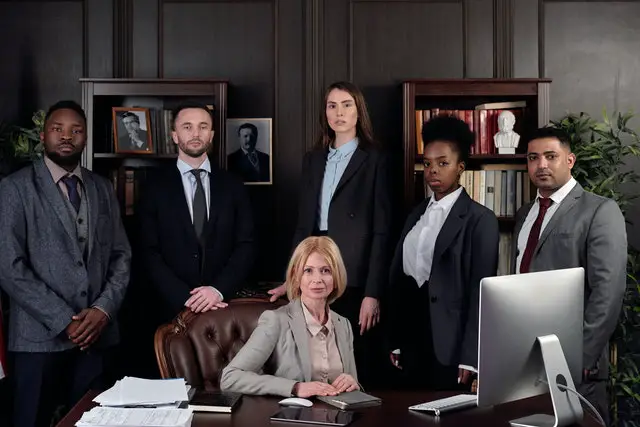
Do Police Investigate Civil Matters | An In-Depth Detail Guide by Expert
The contents of this web page are for informational and educational purposes only, and nothing you read is intended to be legal advice. Please review our disclaimer before taking action based upon anything you read or see.
Do police investigate civil matters? If you need to involve the Police in a civil matter, one must consider whether or not they have the correct character traits and legal knowledge if they hope to represent you in court best. Some tips to help you be sure that the person you hire is indeed qualified for this job and can successfully help bring about an amicable court settlement. While it can be appealing to hire a lawyer for legal advice, you might assume that Police will investigate all of the details to prove your case. However, that’s not always the case.
Do Police Investigate Civil Matters?

In the eyes of the law, there is a marked difference between crimes and civil matters. Crimes are those violations committed against society as a whole. To punish those who commit such acts, police officers investigate the crime scene and collect evidence used in court against them.
The accused person then faces trial by jury before being found guilty or innocent of breaking the law. On the other hand, civil matters do not result in criminal charges being laid, nor do they punish anyone for wrongdoing – rather, they provide a legal mechanism to resolve disputes between two or more parties involved in a case.
Unfortunately, many victims believe that it is their right to demand justice from their perpetrator(s) because they have been wronged. However, this isn’t always the case.
In most instances, police officers will not investigate civil matters as there is no criminal element involved. This means that any evidence collected at the scene of the dispute will likely not be admissible in court should the matter go to trial.
This can often be frustrating for victims who feel that their case isn’t being taken seriously. Still, it is important to remember that law enforcement officials are only responsible for investigating crimes and upholding justice within the criminal justice system.
Civil matters are best resolved through private attorneys or mediation, which is a process where both parties involved meet with a neutral third party to try and come to an agreement. If an agreement cannot be reached, the case may proceed to court, where a judge or jury will hear both sides of the story and then rule on the matter.
Who Investigates Civil Cases?
The city attorney’s office investigates civil cases. They are responsible for prosecuting civil cases but not criminal matters. Civil cases include family law, consumer protection, and fraud.
The Country Attorney’s Office is part of a Country’s Government and is usually headed by a Country Attorney. The city attorney may appoint sub-attorneys to prosecute some cases.
The District or Superior Courts handle civil cases. This is the first level of court in the state of Washington. There are nine districts in Washington, and they are further divided into 39 or greater counties.
What is Civil and Criminal Law?

Civil law is a significant part of most of the legal systems in the world. In civil law systems, litigants expect to investigate the facts and the laws regarding their legal cases. The choice then comes to a decision based totally on the information of the case.
In contrast, the state must prove a person’s guilt beyond a reasonable doubt in criminal law systems. The parties can settle out of court in criminal and civil law systems.
What is Civil Fraud?
Civil fraud is committed by an individual or an organization who intentionally deceives a victim and causes the victim to suffer financial loss. It is a fraud directed toward private citizens or organizations and not intended to deceive the government.
Civil fraud is any deliberate deception or acts made to deceive another person into causing harm to them. A person who commits civil fraud is said to have committed civil fraud.
A difference between civil and criminal fraud is that criminal fraud is directed toward the government and is always a crime. In contrast, civil fraud is directed towards the citizens or organizations and is never a crime.
How to File a Complaint with a District Attorney?

You can either file a complaint online or mail it in two ways. In both instances, you may pay a positive fee. In case you need to document a criticism online, you may go to the website of your district legal professional. You can check your district website here.
Once you are on the website, you will have to select the county where the incident occurred and select your case type. Then you will have to write your statement and sign it digitally.
The district attorney’s office will investigate and send you an email regarding the decision. If you want to file a complaint by mail, you can download the proper forms from the website of your district attorney. As soon as you’ve got crammed out all of the relevant forms, it is up to you to publish them for your neighborhood district attorney’s office.
You can also check your district website to find out the proper procedures and other things on filing a complaint.
Why Should You Hire a Civil Law Attorney?
A civil attorney provides professional help with legal matters, suppose you’re in a situation where you want the use of a lawyer. In that case, it’s good to know that you’ll be matched with an attorney who is appropriately qualified and has experience directly related to your case.
This could be someone who specializes or happens to be interested in those types of cases, precisely when it comes down to helping you find a successful conclusion! You are dealing with a contract dispute in your case, which is essential because you could lose the argument if you do not handle this correctly.
You want to hire someone who can help you resolve the issue as soon as possible, and that is why you should go with a civil attorney who can help you draft a contract (that is also a pie) that works for all parties involved.
What are the rights of an individual involved in a civil matter?

An individual engaged in a civil case has several rights. Civil rights include the right to due process, petitioning the government, and voting. These rights are protected by both the government and the law. Civil rights also retain the right to a fair trial and appeal.
A person involved in a civil matter has the right to question the other party in the court to get relevant information supporting his claim and the duty to present his evidence to the court.
What can an individual do to stop being harassed?
A lot depends on your attorney and the facts of your case. If you haven’t retained an attorney, you should do so. A competent attorney should have a plan of action to make sure the harassment stops. If your attorney is willing to discuss their plan of action, you should make sure you understand it because you’ll be requested to do something you could no longer want to do.
If you don’t think your attorney’s plan of action is good, you need to ask that attorney to talk to the other side’s attorney to see if they will agree to stop the harassment.
What are the Highest-Profile Civil Cases of all time?

The O.J. Simpson criminal case and subsequent civil case are probably one of the most high-profile cases of all time. OJ Simpson went to court and was found not guilty of the murders of Nicole Brown Simpson and Ronald Goldman.
The second most high-profile case would be the Elvis Presley estate battle between his widow and parents. Priscilla Presley was awarded $10.5 million from the estate after the death of her husband, who died without leaving a will.
What needs to be shown to the Police to investigate civil matters?
To start a civil matter, you will first have to contact the Police and file an FIR (First Information Report); this is true in all cases, not just sexual harassment cases. Although the Police may not help you in the investigation, they may show you in writing that they have indeed taken down your complaint, with the date and time of your visit and the officer that took down the complaint.
Later on, you may need this to later on when you initiate the civil case, show that you have indeed complained to the Police.
How much does it cost for Police to investigate a civil matter?

Public tax dollars fund police work. An investigation costs money, and the amount you pay will depend on the nature of the crime, as well as how much time you spend analyzing it. If a crime is minor, it will cost less for the police department to investigate.
If a crime is major, it will cost more for the investigators to provide more time, manpower, and resources. Major crimes include murder, rape, burglary, assault, and theft. For minor crimes, the cost would be nominal. Certain police departments offer a fee schedule that explains the charges, but this can vary between jurisdictions.
For example, an assault case in one jurisdiction might cost $500 in another.
Frequently Asked Questions
What policy does Police use when investigating civil matters?
Police will typically only get involved in civil matters involving criminal activity – such as fraud or theft. However, they will enter a property and remove any people without permission if they have a court order.
For example, if your neighbors have stopped paying the rent and ask the Police to remove them, they will do so.
What should an individual do if the Police do not provide them with protection?
If a police officer refuses to protect an individual, that character must complain about the officer to his higher-ups. If no alternate mindset is visible, then that individual should complain to the Police internal affairs. Though this option is not very effective in a police department, it is worth trying if nothing else works.
Do Police usually investigate civil matters?
- Yes. They take their job very seriously.
- No. They don’t care about civil matters.
When do you think the Police should be allowed to get involved in civil cases?
- A crime can be anything from violating terms of service to copyright infringement and so much more.
- When other people are in danger.
- Only when it’s convenient for them.
Role of Police in civil cases
- Police should not intervene in civil cases.
- Police should only intervene in civil cases when another citizen violates the rights of a citizen.
- Should intervene in both criminal and civil cases.
Do you feel Police should be involved in civil cases?
- Yes, because it’s their job
- Only if there’s a threat of violence
Conclusion
You can file a civil filing against someone without involving the Police. When it comes to filing a civil lawsuit, you are the one who is responsible for filing the paperwork. This is the case whether you are filing a claim against a business, individual, or corporation in the state of Illinois.
Are you filing a claim against an individual or business in Illinois? You can also file a police report. If you are filing a claim against a person or business, you can additionally file a police report. The police report will help you prove your case and allow you to pursue criminal charges against an individual, corporation, or business.
References
- https://www.uscourts.gov/about-federal-courts/types-cases/civil-cases
- https://www.civillawselfhelpcenter.org/self-help/getting-started/court-basics/56-types-of-cases
- https://www.civillawselfhelpcenter.org/self-help/lawsuits-for-money/overview-of-a-civil-case
- https://www.lawinsider.com/dictionary/civil-matters
- https://www.wbrandywine.org/index.asp?SEC=25F58029-CFD8-4AD9-9087-9CD6D132A7D3&DE=8084E7DF-536C-4B4D-BD41-4380631F181A&Type=B_BASIC
- http://www.svcinthevillages.org/civil-vs-criminal-explained
- https://www.pinow.com/investigations/civil-investigations
- https://www.mololamken.com/knowledge-What-Is-the-Difference-Between-a-DOJ-Civil-Investigation-and-a-DOJ-Criminal-Investigation
- https://www.lilesparker.com/2018/06/18/civil-fraud/
- https://www.justice.gov/usao-cdca/civil-division/civil-fraud

I’m a driven and accomplished law graduate and post-graduate, passionate about sharing my legal expertise via my blog. I hold a Bachelor’s degree in Law from the University of London (UK) and a Master’s in Law from the University of Derby (UK). Both gave me the foundational knowledge and skills to excel in my chosen career path.
Throughout my academic journey, I have gained extensive knowledge in various fields of Law, including Corporate and Business Law in the USA, Criminal Law, International Law, US Copyright law, and most importantly, American Constitutional law.


Comments are closed.